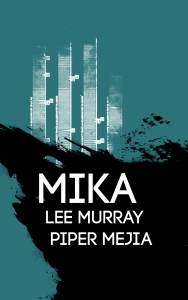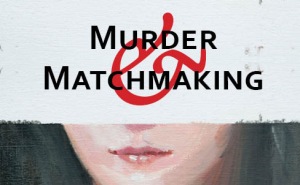We hope you enjoy this free excerpt from Mika, by Lee Murray and Piper Mejia, the first in our SHORTCUTS series of novellas.

New York, 2058
The rain is coming down hard now, pummelling the windscreen in grey, almost horizontal sheets. Mika frowns. Taking one hand from the wheel, she rubs at her eyes. It’s been a long trip and she’s tired. She can barely see ten metres in front of her.
The waka rolls violently. Mika purses her lips and shifts the vehicle to a lower gear, struggling to control the vessel in the surging waters. A vehicle bumps her from behind, the waka lurches, and Mika is thrown forward.
‘Tangaroa!’ she whispers under her breath, calling on the sea god of her ancestors for protection. The waka pitches again. Mika yanks at the steering, pulling hard to the left to get out of the queue. In the choppy water, the waka is slow to respond. Mika can do nothing more. She holds her breath, her eyes straining to penetrate the wall of rain. Another jolt. The larger transport crowding her from behind. She’s in danger of being sandwiched in, her waka crushed between two hulls.
Come on!
She didn’t travel first the Pacific, and then the Atlantic, to be shipwrecked arriving on the dock. She has a meeting to make. Biting back her frustration, Mika guns the accelerator. The prow of her waka touches the transport in front, the way a bull might caress the bullfighter’s cape as it thunders past. Mika exhales as the waka pulls clear. The manoeuvre has prevented a goring, but she’s going to have to head straight to the ramp now. Determined, she squeezes her prow through the traffic, pushing to the front like the smallest kid at a tuck shop queue.
Coming through, people.
At last, the waka’s hull touches home. Quickly, Mika changes transmission, and drives the little transport up the ramp onto the land.
The Ellis Island entry point is in chaos. What Mika can see of it, in any case. Gale-force winds and driving rain have reduced visibility to next to nil.
Is this the immigration point? Mika opens the window and is immediately soaked.
A man in a flapping yellow raincoat peers in, his face ruddy from the rain. Even with the wet, Mika can smell the engine fumes. She shivers in her wet clothes, but only partly from the cold. She waits for the officer to scan her pupil.
Please don’t make me go back.
The man shakes his head. ‘The bio-scanner is down. Cybernetic reader, too. The console was hit by flying metal. We’re back to working like cavemen. Where are you from?’
‘New Zealand.’
Someone behind sounds a horn. Raincoat man pulls away from the window and roars into the wind. ‘Hold your damn horses, why don’t you? I’ll get to you when I get to you.’ He turns back to Mika. ‘Where did you say?’
‘New Zealand. It’s an island—’
‘Staten Island? You’re a local? You do know you’ve landed at Ellis? Day like today, you should’ve taken the expressway, not the shortcut across the Bay. What kind of idiot are you? I suppose you wanted to see how your home-made transport handled a storm.’ He shakes his head in disgust.
‘No, no, you misheard me. I’m from—’
But huddled deep in the hood of his plastic raincoat, the official either doesn’t hear, or doesn’t care to hear. ‘All we need. Locals wasting our time, coming through the immigration line. Drive on,’ he grumbles, gesturing impatiently. ‘You’re holding everyone up.’
‘I—’ But raincoat man has already turned his attention to the next vehicle in the line. Mika shrugs. If he’s going to make it this easy to get in, who’s she to argue? Sliding up the window, she shifts the waka into gear.
He shouldn’t have called her an idiot.
‘For your information, mate,’ Mika mumbles to herself, ‘this isn’t just any old home-made transport. It’s a waka. And her name is Torua, if you care to know.’ Mika revs the engine, giving the man a good whiff of Torua’s engine fumes, and speeds into the gloom.
The rain hasn’t abated any as Mika takes the bridge to the mainland. On the road, the visibility is even worse. There are transports everywhere. Their lights glare, the milky beams multiplying in the gloom. Mika slows, getting an earful of honking and tooting from the traffic backing up behind her.
Keep your hair on.
She turns on Torua’s GPS system and, doing her best to keep her eyes on the road, punches in the rendezvous point.
‘Calculating.’
The message had said it wasn’t too far from the bridge. Mika doesn’t want to miss the turn-off, or she could end up miles out of her way. She can’t afford to miss the guide.
‘Left turn approaching.’
Mika peers ahead, but can’t make out the intersection through the fog of lights.
‘Left turn approaching in … twenty yards.’
‘But I can’t see anything!’ she wails.
Finally, the intersection fades into view. Hang on, there are two lefts. Which one is she supposed to take: the hard left or veer left?
‘Left turn approaching…’
‘Which lane?!’
The middle, take the middle.
The lights change.
Mika guns the engine to get across the gap.
A vehicle screams towards her.
Oh my god, oh my god.
She stomps on the brakes, but already she knows it’s too late. As the two vehicles plunge towards each other, like jousters in a medieval battle, Mika stretches her mind across the ocean to Aotearoa, to her sister.
Huia.
Mika.
The voice is weak and thready. Mika’s heart clenches. Huia needs her. Needs her to get to Vegas. She has to—
There’s an agonising crunch, followed by a whine that starts in Mika’s teeth and settles in her bones. Torua spirals out of control. Mika is flung sideways, her head glancing off the side of the waka, before she’s thrust upright again in a brutal whiplash. Soundless now, torque and momentum carry the vehicle through the intersection in a slow-motion blur, the front left corner trailing something with it. Obligingly, the object allows itself to be dragged along, throwing up silent sparks and shedding debris. Resisting the urge to cover her face, Mika grips the steering wheel and gently turns Torua into the curve. But the waka has power yet. It hurtles through a barrier, barely slowing. Losing the foreign object, it slides another twenty metres before coming to a stop on a huge traffic island.
‘Right turn approaching in twenty yards—’ Mika switches off the GPS, and hunches over the steering wheel, panting. When her pulse has slowed, she takes a deep breath and checks herself over. A few bruises. A bump the size of a small kūmara on her elbow, but otherwise all intact.
I’m okay. Alive.
Mika’s heart leaps again. But what about the other driver? The other vehicle?
Flicking the compression, Mika flings open the hatch, pushing hard against howling wind. She climbs out of the waka, the hatch slamming shut as soon as she lets go. Mika squints through the rain. The bull bars, two rows of thick bars that encircle the waka, have been scraped back to the metal, the barnacles and rust of the ocean voyage sloughed off like dead skin. But, not built to withstand playful whales and floating garbage, the other vehicle hasn’t been so fortunate. Glancing off Torua’s bull-bars, it has struck a tree, and is a mess of broken branches, twisted steel, and glass, the driver door buckled inwards where the two vehicles collided. Instinctively, Mika knows it can’t open. Boots crunching on broken glass, she clambers onto the hood. The windscreen’s gone, leaving a glass-encrusted frame. The driver is slumped forward over the dashboard, oblivious to the rain thwacking at his back. Probably concussed when his head hit the windscreen.
‘Hey! Hey there! Can you hear me?’ she screams over the sound of the storm. She pushes her hair out of her face. ‘I’m coming. Hold on.’
Using her boot, she breaks a branch underfoot, clearing the way so she can skirt around to the other side of the vehicle, then yanks on the passenger door, which, to her surprise, opens easily.
Oh thank god.
Climbing into the cab, she brushes away the glass on the seat with a dripping sleeve, then scoots over and gently pulls the man backwards by his sweatshirt.
‘Can you hear me?’ But he can’t hear her because he’s dead, a branch buried deep in his eye socket. Mika jumps back, relieved when the man slumps forward again, the grisly eye no longer looking at her blankly.
What have I done?
Leaning back in the passenger seat, Mika lets the rain wash down her face. Then she bursts into tears.
Subscribe to SHORTCUTS for NZ $3.33/month | Purchase at Amazon | Purchase at Kobo (Available 3 April 2015)



